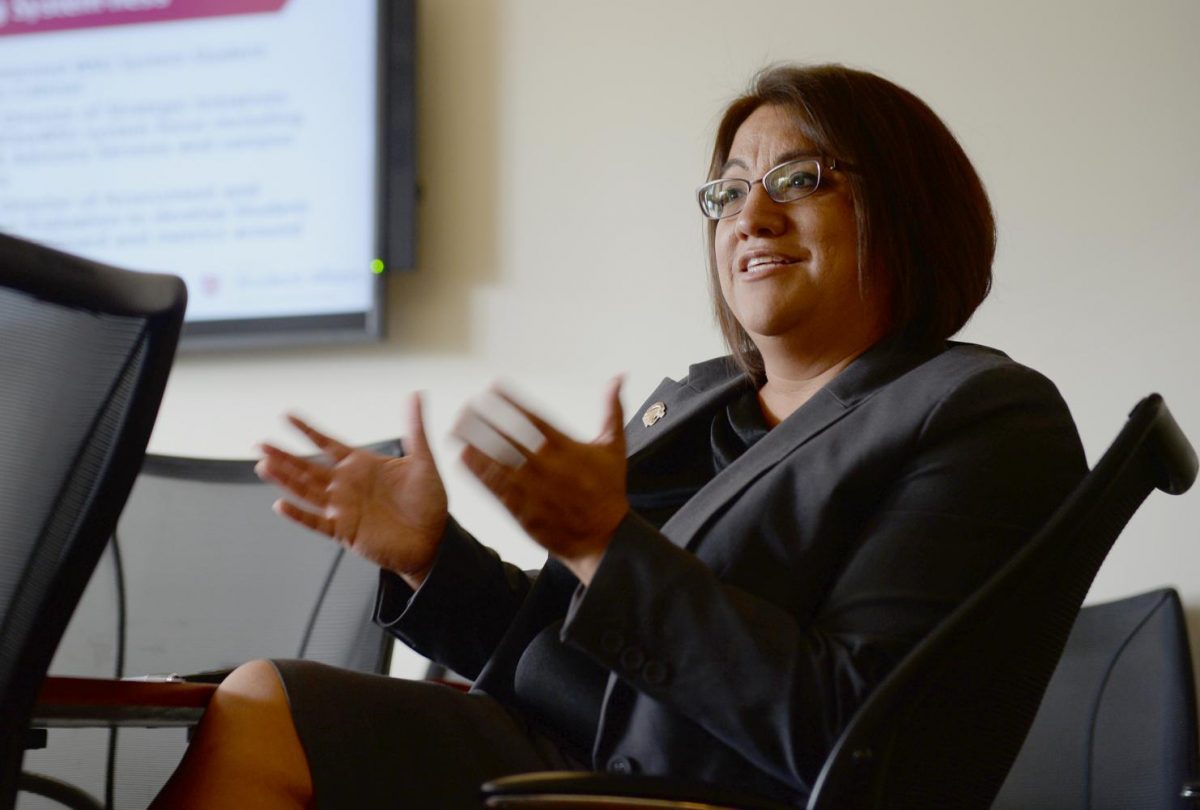Student Affairs to reduce travel costs, hold positions vacant
Vice President Mary Jo Gonzales said the division is not considering layoffs this year
MICHAEL LINDER | The Daily Evergreen
Vice President of Student Affairs Mary Jo Gonzales discusses changes to the student conduct process at the Board of Regents meeting Sept. 21
November 21, 2017
Vice President of Student Affairs Mary Jo Gonzales held a closed meeting Monday with full-time staff of the division to discuss reducing travel expenses and maintaining vacant positions.
The Evergreen followed up with her the next morning for an individual meeting during which Gonzales explained her approach to reducing expenses by 2.5 percent throughout her department over the next fiscal year.
Gonzales said Student Affairs will reduce spending in two main areas: leaving positions vacant and reducing maintenance and operations fees.
She said in all, the division will be saving $132,625, with $68,154 coming from salary savings and $64,471 from operations and maintenance reductions.
“That’s about four or five positions in the division that are not being filled or they’re being delayed in fill and not starting until July,” Gonzales said.
Vice President of Marketing and Communications Phil Weiler said that part of this process will be making sure positions are not overlapping and consolidating resources.
“It gives us the opportunity to look at what our core functions are, decide what we can and cannot do, and evaluate staff according to those priorities,” Gonzales said.
On a case by case basis, some employees may be compensated more for doing extra work for vacant positions. He added that WSU President Kirk Schulz wants the departments to avoid salary increases that are out of step with university-wide salary increases.
Gonzales said this will also involve changing work to be more efficient, using transitioning from paper to digital document filing as an example.
Gonzales said that while her division will not be considering layoffs to staff for the 2018 fiscal year, they will need to make those considerations in 2019 and 2020. As much as 88 percent of Student Affairs’ state-allocated funds go toward personnel.
She said as vice president, 10 percent of her operations and maintenance allowance is going away. This means they will have reduced support for banquets and speakers.
Gonzales said they will be looking at all travel expenses to reduce costs, but will be making exceptions for staff professional development.
“Some people need to go because of positions they serve on national boards or they’re getting national recognition so they travel for that,” Gonzales said. “Some of our medical and maintenance staffs need to have certification.”
While Gonzales discussed keeping some positions vacant to save money, she also talked about positions Student Affairs has been able to maintain and the search for new associate vice presidents.
On Nov. 3, Gonzales announced that Student Affairs had found funds to maintain two retention counselor positions and a manager position within Multicultural Student Services.
In order to retain two retention counselor positions within MSS, Gonzales said the department had to look internally to find funding for those positions. She said no money was added from Student Affairs’ central fund.
She said that potential candidates for the new associate vice president positions may start arriving on campus in February and March, but she does not expect anyone to begin in the position until late spring or early summer.





















